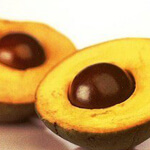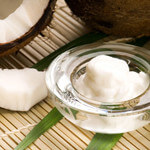 The lucuma (Pouteria lucuma) is a subtropical fruit native to Peru, Chile, and Ecuador. It is especially popular in Peru, and is closely linked to the nation’s culture. For example, lucuma is commonly found at the burial sites of indigenous people, and it is often incorporated into the ancient Moche people’s artwork. Even today, lucuma is Peru’s most popular ice cream flavor, trumping both vanilla and chocolate.
The lucuma (Pouteria lucuma) is a subtropical fruit native to Peru, Chile, and Ecuador. It is especially popular in Peru, and is closely linked to the nation’s culture. For example, lucuma is commonly found at the burial sites of indigenous people, and it is often incorporated into the ancient Moche people’s artwork. Even today, lucuma is Peru’s most popular ice cream flavor, trumping both vanilla and chocolate.
Lucuma is not well-known outside of South America, even though the lucuma tree can thrive in any subtropical region of the world. That said, this exotic fruit is gaining popularity worldwide as word continues to spread about its significant medicinal value and sweet, pleasant taste, which is often compared to that of caramel or butterscotch.
List of Health Benefits
Natural healing abilities – According to researchers at The State University of New Jersey, lucuma extracts can promote wound healing, enhance tissue regeneration, and induce cell migration. The researchers also discovered that the fruit can provide “an agent that is useful for therapeutic or cosmetic maintenance of skin and scalp.” These results shouldn’t be too surprising to the natives of Peru, who have utilized lucuma as an anti-inflammatory (as well as an antifungal, antibiotic, and skin booster) for centuries, ultimately crowning it the “Gold of the Incas” due to its potency.
Healthy sugar substitute – Lucuma powder is an excellent gluten-free sugar substitute, and can help satiate sugar cravings without damaging the body (unlike sugar or artificial sweeteners). Many people like to add the powder to their superfood smoothies, since its attractive taste helps to disguise the unattractive tastes of certain vegetables and supergreens. Despite its sweetness, however, lucuma powder only contains 2 grams of natural fruit sugar for every 11 grams of carbohydrates, making it a low glycemic index food that can help stabilize blood sugar levels.
Rich in minerals – A Chinese report entitled Analysis of Trace Elements in Lucuma nervosa shows that lucuma contains 14 trace minerals, and is especially high in potassium, sodium, calcium, magnesium, and phosphorus. Due to ongoing soil erosion, deficiencies in these important minerals are becoming increasingly common in the West, so receiving more of them – ideally from whole foods like lucuma – is an important initial step towards reclaiming our health. Significantly, the report also noted that lucuma products imported from South America were very low in heavy metals like lead and cadmium.
Regulates the digestive tract – Like many fruits, lucuma is high in dietary fiber. We all know that fiber helps to sweep the colon of accumulated waste and normalize bowel movements, but it also helps us absorb sugar, thereby reducing our risk of type 2 diabetes. Moreover, fiber helps us reduce our total cholesterol levels since it encourages our liver to produce more bile salts, which in turn boosts its production of LDL receptors.
Purchasing Lucuma
Since fresh lucumas ripen quickly and are delicate to handle, transporting them from South America to the United States (and the rest of the world) is a challenge that few suppliers are willing to consider. As a result, lucumas are usually purchased in powdered or dried form outside of their native countries. Powdered lucuma is the most popular form in the United States, and is sometimes used in the manufacture of gourmet ice cream and baked goods. Please note, however, that heating lucuma products will compromise their nutritional value.






